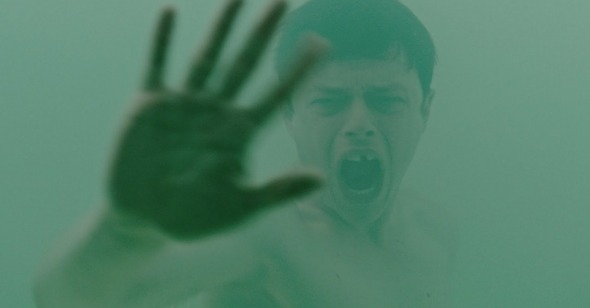The Imaginarium of Dr. Verbinski
By Keith Uhlich
A Cure for Wellness
Dir. Gore Verbinski, U.S./Germany, Twentieth Century Fox
We all know—or should know—that movies aren't (necessarily) their ad campaigns. There are plenty of gaps, interpretive and otherwise, between the selling of a work of art and the actual experience of it. Still, it’s easy to conflate elements of trailers/TV spots/pull quotes with a film in toto, to see one form as inevitably, often messily informing the other, especially when there's little else of interest to consider. In the case of A Cure for Wellness, it’s difficult to separate the inert, interminable 146-minute end product—a goofy, gory psychological thriller that cribs liberally from the Lon Chaney Phantom of the Opera, Stanley Kubrick's The Shining, and Hammer Horror productions, among other influences—from the PR, specifically the “visionary” label affixed to director and cowriter Gore Verbinski.
Make no mistake, there are "visions" here, but they're of the hollowest sort—pretty pictures, some interesting in broad-stroke conception, that are nonetheless leeched of those intangible qualities that would lend them genuine grandeur and thematic heft. As a result, they just sit there, heavy on the eyes, light on the heart and mind. That's a staple of the Verbinski oeuvre; think of Jack Sparrow's desert-set, doppelgänger-heavy hallucination (surrealism by numbers) in the third Pirates of the Caribbean or the numbingly chaotic train chase that climaxes The Lone Ranger. Even his dive into animation, Rango, the faux-Western with a nerdy chameleon, feels weighted in all the wrong ways, its arid cartoon imagery and convoluted plotting (cribbing from Chinatown) big and busy, but never taking flight. To borrow Manny Farber's parlance, Verbinski is a white elephant who fancies himself a termite.
A Cure for Wellness keeps with custom, opening with some stiltedly eerie pillow shots of Manhattan skyscrapers, framed by cinematographer Bojan Bazelli to resemble soul-sucking monoliths. Inside one of these behemoths, a corporate drone clutches his chest and keels over. As he drops to the floor, he knocks over a water cooler, its contents rhythmically spurting on the carpet. The main title appears over a wide shot of empty computer stations, the fresh corpse's legs jutting out artfully from behind one of the desks. It's social satire, Verbinski-style, not to be undone a few minutes later when our protagonist, cutthroat Wall Street broker Lockhart (a pastier-than-usual Dane DeHaan), is threatened with prison rape by a female executive (Lisa Banes) who has uncovered his involvement in a shady trade. "You ever have a big, black 12-inch cock up your ass?" she asks Lockhart with steely smugness. The immediate smash-cut to the perpetually underappreciated African-American actor Carl Lumbly, playing another of the financial firm's higher-ups, is just the cringe-worthy cherry on top.
Lockhart has two choices: jail, where that engorged dark phallus awaits; or head overseas to seek out one of the company's missing partners, Pembroke (Harry Groener), who appears to have gone mad and holed himself up in a remote European sanitarium. An additional wrinkle: the hand-written letter of resignation that Pembroke sent to the firm apparently caused the death of the man in the opening scene—insanity, so it seems, infects and kills.
For the next near-hour, Lockhart's journey to and initial exploration of the spooky Gothic spa (the exteriors of which were filmed at Hohenzollern Castle in Germany) are intercut with flashbacks to events from his life, an odd, awkward mix of forward motion and ghostly remembrance. Some of these episodes are recent, like the death of his mother (Rebecca Street), who spent her declining years sculpting figurines, one of which—a ballerina—unsettlingly presages a nightmarish situation to come. And then there's a more distant childhood memory: the suicide of Lockhart's father, seen only from behind, through a rain-slicked windshield, as he jumps off a bridge.
This is a life peppered with tragedy, which perhaps explains why Lockhart is such a grade-A jackass. "Business or pleasure?" asks the conductor on the train shepherding him to the sanitarium. "What do you think?" he retorts, glancing up angrily from his computer with its ever-spottier Wi-Fi connection. It's certainly not imperative for a lead character to be likable, and DeHaan can play the narrow-eyed creep with the best of them. But Verbinski and his co-scenarist Justin Haythe often seem to be too giddily setting up Lockhart's eventual fall, amplifying his exasperating qualities so as to make his humbling that much more gratifying.
Lockhart's intention is to get in, get Pembroke, and get out. But the spa's thick-accented owner, Volmer (Jason Isaacs, combining doctors Oz and Mengele), has other plans, as he does with most of his exclusively wealthy clientele. The slow—very slow—reveal of Volmer's endgame admittedly has a few perverse pleasures. There's the spectral young woman, Hannah (Mia Goth, aka Mrs. Shia LaBeouf), who wanders around the lush grounds in a shell-shocked daze. There are the labyrinthine qualities of the sanitarium itself, with its endless hallways and cavernous rooms that seem to morph in accordance with each patient's nebulous state of mind. (Eve Stewart's production design is one of the few elements here above reproach.) And there's the blunt effectiveness of several of the shock-scares, from a Marathon Man-like tooth-drilling setpiece to recurring appearances by ravenous eels that play like psychosexual delusions dreamed up by a steroidal Sigmund Freud.
More often, though, the self-consciously imaginative scenarios are smug and superficial. A lengthy sequence in a dive bar populated by hot-tempered German hooligans seems designed purely as catnip for those hardcore auteurists who know of Verbinski's side gig as an L.A.-based punk rocker. And though the CGI overkill that made the Pirates movies and The Lone Ranger such lumbering eyesores is somewhat tempered, the director can't help but go full computer for a climax that whips together incest, infernos, and anti-capitalist bromides. The result is the strangest yet blandest of brews.
